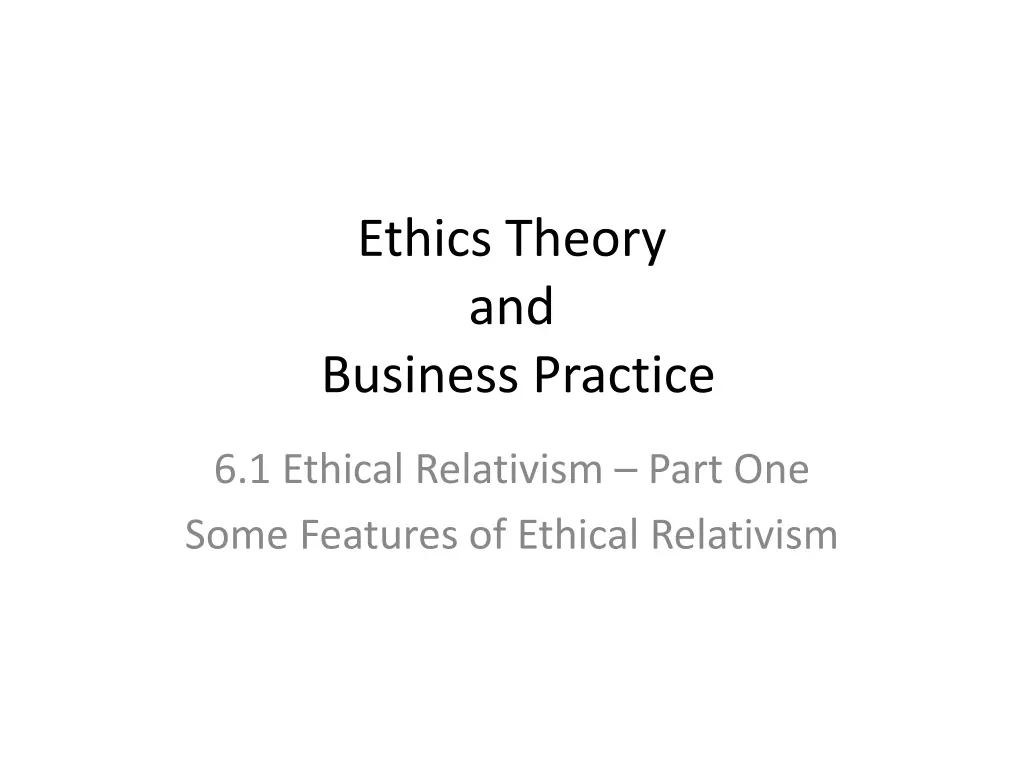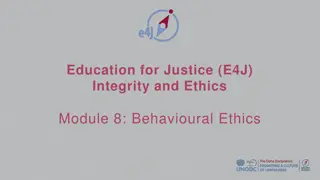
Understanding Ethical Relativism in Business Ethics
Explore the differences between ethical relativism and ethical absolutism in the context of business ethics. Discover how ethical relativism emphasizes variations in ethical attitudes, ethical autonomy, and the importance of individual ethical convictions. Contrasting ethical relativism to ethical universalism sheds light on the relevance of place, the nature of ethical statements, and the role of emotion versus reason in ethical judgment.
Download Presentation

Please find below an Image/Link to download the presentation.
The content on the website is provided AS IS for your information and personal use only. It may not be sold, licensed, or shared on other websites without obtaining consent from the author. If you encounter any issues during the download, it is possible that the publisher has removed the file from their server.
You are allowed to download the files provided on this website for personal or commercial use, subject to the condition that they are used lawfully. All files are the property of their respective owners.
The content on the website is provided AS IS for your information and personal use only. It may not be sold, licensed, or shared on other websites without obtaining consent from the author.
E N D
Presentation Transcript
Ethics Theory and Business Practice 6.1 Ethical Relativism Part One Some Features of Ethical Relativism
aims to outline some ways in which an ethical- relativist approach to business ethics differs from an ethical-absolutist approach explain why ethical relativism does not necessarily entail ethical indifference
ethical relativism challenges the idea that the same standards of ethics should apply everywhere is concerned with exploring variations in people s attitudes towards ethics and considering why these variations might exist puts a lot of emphasis on ethical autonomy; encourages people to give expression to their own, deepest ethical convictions
contrasting ethical relativism to ethical universalism across three dimensions: 1. the relevance of place 2. the nature of ethical statements 3. how to work out what is right and wrong
1. the relevance of place relativism vs universalism ethical absolutism seeks universal standards that can be applied everywhere ethical relativists explore differences that are relative to place
2. the nature of ethical statements subjectivism vs objectivism ethical absolutism seeks objective truths about ethics ethical relativism considers that ethics may be a matter of subjective opinion
3. how to work out what is right and wrong emotion vs reason ethical absolutism emphasises the role that reason plays in ethical judgement ethics involves detached, dispassionate application of abstract, theoretically derived principles ethical relativism emphasises the role that emotion plays in ethical judgement highlights the importance of proximity to ethics
ethical relativism and ethical absolutism at Jurassic Park www.youtube.com/watch?v=0Nz8YrCC9X8
ethical relativism does not provide grounds for ethical indifference does provide good reason for ethical reflection
theory in practice ethical absolutist and ethical relativist approaches to Foxconn s employment practices
key points ethical relativism offers different ways of thinking about business ethics from ethical absolutist theories ethical relativism does not justify indifference about business ethics






















